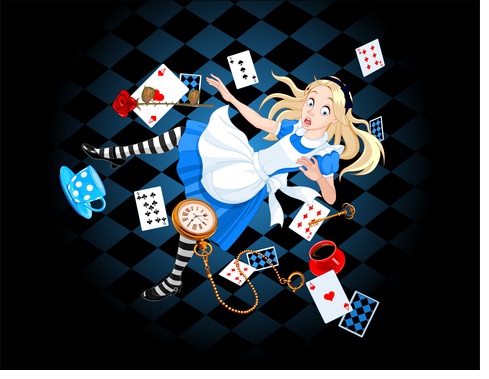That’s how many software patent holders must feel ─ like they were walking along merrily through the woods when they fell suddenly into a blinding, winding rabbit hole. Where once their patents stood bold and tall, they have now shrunk to a seemingly indefensible size. Whether they can defend their so-called “abstract” patents in court is now as unclear as the Mad Hatter’s riddles. The famed Alice decision has certainly left many in the patent world wondering. In the spirit of fairytales, we shed some light on this issue before the Alice decision was decided, contemplating whether the opinion could, like one of the Billy Goat’s Gruff, “make or break a range of patent lawsuits, including many by so-called patent trolls.” Patent trolls purchase, often from defunct or failing start-up companies, large quantities of patents with no real intent to develop the inventions but, rather, for the primary purpose of threatening patent litigation and collecting licensing fees. Not a bad gig, but certainly a hindrance to inventors out there who have developed a credible and viable product. The Alice opinion, issued in June, 2014, was very gruff on trolls in its finding that patents which involve computerized methods are invalid if they are “directed at an abstract idea.” That sounds like a Mad Hatter riddle in and of itself. Don’t be shy. Be like Alice and inquire: “What does that mean?” Basically, if the process is one that can be carried out by a human using pen and paper, an inventor cannot patent the mere conversion of that process to a computer program. Post-Alice many computer program patents were struck down as invalid. Nowadays, trying to create a software program the USPTO will not see as “directed to an abstract idea” has become as hard as trying to explain why a raven is like a writing desk.
In the spirit of fairytales, we shed some light on this issue before the Alice decision was decided, contemplating whether the opinion could, like one of the Billy Goat’s Gruff, “make or break a range of patent lawsuits, including many by so-called patent trolls.” Patent trolls purchase, often from defunct or failing start-up companies, large quantities of patents with no real intent to develop the inventions but, rather, for the primary purpose of threatening patent litigation and collecting licensing fees. Not a bad gig, but certainly a hindrance to inventors out there who have developed a credible and viable product. The Alice opinion, issued in June, 2014, was very gruff on trolls in its finding that patents which involve computerized methods are invalid if they are “directed at an abstract idea.” That sounds like a Mad Hatter riddle in and of itself. Don’t be shy. Be like Alice and inquire: “What does that mean?” Basically, if the process is one that can be carried out by a human using pen and paper, an inventor cannot patent the mere conversion of that process to a computer program. Post-Alice many computer program patents were struck down as invalid. Nowadays, trying to create a software program the USPTO will not see as “directed to an abstract idea” has become as hard as trying to explain why a raven is like a writing desk.
In direct response to the confusion, the USPTO issued guidelines in 2014 that did offer a crumb of hope, a little “EAT ME” cake that could help software inventors grow. If the patent applicant could recite “additional elements that amount to significantly more” than a mere conversion of human processes, the innovation could be patented. Thank you, that clears things right up. While it was a bit of an amorphous exception, it did work for some – MacroPoint for example. MacroPoint is the holder of a patent that provides tracking information for freight carriers using a driver’s mobile phone to offer load status and location information to third parties seeking information about their shipment. That seems helpful. Does it also seem directed at an abstract idea? Or does that question seem too abstract itself to answer? Alice pleads again: “What does that mean!?” Clearly there is confusion because the USPTO, even applying the dizzying principles of the Alice opinion, found some of MacroPoints patents valid, but the court did not. In MacroPoint’s recent patent infringement suit against another freight locator inventor, FourKites, MacroPoint sued on four patents deemed by the USPTO, post-Alice, to be valid. The U.S. District Court for the Northern District of Ohio, however, found them invalid, despite precedence that issued patents by the USPTO are to be presumed valid by the courts. That’s confusing, don’t you see? “I don’t see,” says the caterpillar.
In all, the Alice opinion and the many varying interpretations and applications of it by the courts have left everyone wondering about the future of software patents. Apparently the Ohio court disagreed with the USPTO in finding MacroPoint’s use of GPS tracking in its software amounted to something “significantly more” to allow it to fall inside the purview of patent-eligible subject matter. But, what is “significantly more” to one may be substantially less to another.
Alice Leaves Software Patent Holders in Wonderland
Tuesday, November 17, 2015
Current Public Notices
Published: 11 August, 2025
Published: 11 August, 2025
Published: 8 August, 2025
Published: 8 August, 2025
Published: 30 July, 2025
Published: 29 July, 2025
Published: 28 July, 2025
Published: 23 July, 2025
Published: 21 July, 2025
Published: 18 July, 2025
Published: 10 July, 2025
Published: 26 June, 2025



 />i
/>i

